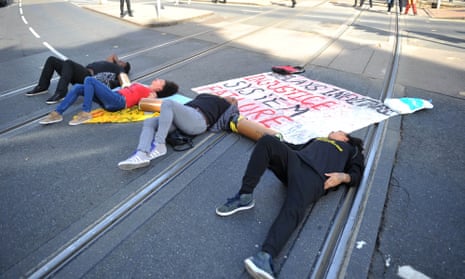Protesters arrested during a Black Lives Matter demonstration in Nottingham have claimed that police treated them disproportionately harshly because of the colour of their skin.
Yvone Francis-Parmar, 50, Eshe Graham, 20, Lisa Robinson, 48, and Malachi Glaiester Thomas, 30, appeared at Nottingham magistrates court last week charged with wilful obstruction of a highway.
On 5 August, the four protesters brought traffic to a standstill when they chained themselves together and lay across tram tracks near the Royal Centre tram stop in Nottingham city centre.
The demonstration was part of a national day of action by Black Lives Matter UK, to protest against what they describe as “a nationwide crisis of racism”. The campaign group was originally formed in the US in response to police shootings of black people.
“My clients feel that they have been targeted because of the colour of their skin,” Haroon Shah, the solicitor representing the four, told the Guardian. He argues that the bail conditions were disproportionately harsh.
Nottinghamshire police said they could not comment on the allegations due to the ongoing court proceedings.
The initial bail conditions, which prevented the four accused from contacting each other or taking part in any organised protest, were lifted following representations from Shah.
The presiding magistrate, John Lock, agreed to lift the conditions and released the four on unconditional bail until their next hearing on 6 September.
“The day after they were arrested there was an [English Defence League] march where all the tram lines were shut down and sections of the city were brought to a standstill at the cost to the taxpayer to the tune of about £200,000,” said Shah.
“Obviously [the anti-racism protesters] feel aggrieved that nothing is done in relation to those people that are marching, where there was basically a shutdown of the whole [city centre], and yet when they’re trying to make their [protest], they are then arrested for obstructing the highway.”
On 6 August, extra officers were drafted in from forces across the country – including Greater Manchester, Durham and Lancashire – to policethe protest by the far-right EDL and a counter-protest by anti-fascist groups.
Nottinghamshire’s police and crime commissioner, Paddy Tipping, estimated that the entire operation would cost the force around £200,000. Five arrests were made, with three people released without charge and another two given court dates.
Shah acknowledged that, unlike the EDL demonstrators, his clients had not obtained permission from the police to hold their protest, but he said that although both groups had similar objectives, to protest, he believes his clients were treated differently to the EDL supporters.
The national day of action this month was timed to coincide with the fifth anniversary of the death of Mark Duggan, who was shot dead by police, sparking nationwide riots. An inquest found that Duggan, 29, had been “lawfully killed”.
Protesters blocked the roads leading to Heathrow and Birmingham airports. Police in London arrested 10 protesters, while West Midlands police arrested five.
A statement from the group, released on the day of the protests said: “This morning UKBLM have #Shutdown roads in London, Birmingham, Manchester and Nottingham to mourn those who have died in custody and to protest the ongoing racist violence of the police, border enforcement, structural inequalities and the everyday indignity of street racism.”
The group highlighted statistics showing that black people are far more likely to die in police custody. They are up to 37 times more likely to be stopped and searched than white people and three times more likely to be arrested than white people.
